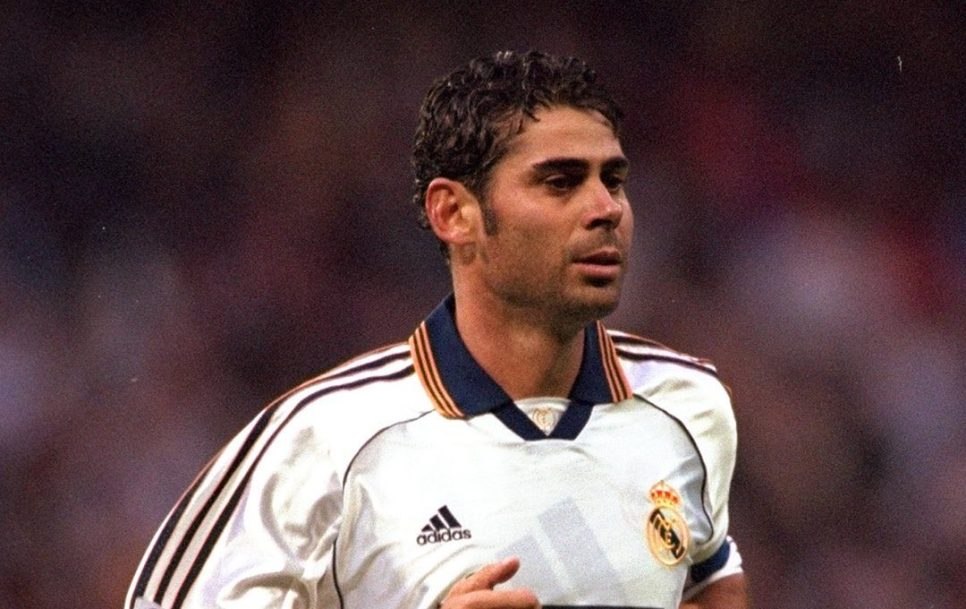When defenders score: A true legend of Real and the Spanish national team
Ronaldo dribbles, runs and scores! Messi did it again! Neymar – the winning goal! We have all heard those cries on football pitches: the star striker saves the day yet once again. But in reality, there are still ten men on the field, and as the saying goes – attack wins you games, defense wins you titles.
To correct the injustice of the (football) world, we invite you to a ten–part series with Olybet.TV, where we talk about defenders. But to make things a little more appetizing, let’s talk about the most productive defensemen in football history.
On the third place in our list, we find Real Madrid legend Fernando Hierro, who scored more than a hundred goals for the Spanish royal club alone. Unfortunately, the man’s end in Real was not as nice as one might have expected…
Quick breakthrough in Real
Hierro was born in Velez, right next to Malaga and acquired his first football skills at home before moving to Valladolid at the age of 18. He also made his La Liga debut for them in 1987, but the defender did not stay there for long, because two years later Real was already knocking on the door.
In Madrid, he started as a defender, scoring seven times in his debut year, but when then-head coach Radomir Antic saw what a jewel of a player the Spaniard was, the coach decided to move Hierro up on the pitch.
In the 90/91 season, Hierro thus operated as a lower midfielder, but a year later he was given even more freedom in midfield. The result was phenomenal: Hierro scored 21 goals in 37 league games, becoming Real’s top scorer!
However, such scoring had a darker side. Namely, with Hierro rushing to the attack, Real’s defense, which is – as we emphasized in our opening paragraph – is what the titles are won with, fell apart. With Real not winning anything under Antic, his successor Benito Floro decided to move Hierro back to defense. And the result? Spanish Cup win!
The following Real coaches also worked in the same way and reaped the fruits of success with the defensive pair Hierro – Manolo Sanchi. Jorge Valdano and Fabio Capello triumphed with this solution in Spain, Jupp Heynckes and Vincente del Bosque in turn in Europe.
A wise sacrifice
Although the move was a success, Hierro still needed some sweet talk to accept it. As he explained in an interview with the Guardian in 2002, he was not the most willing to be relegated to central defender. “Being on defense, I can watch the game unfold in front of me from a distance. I’ve often thought that it’s a shame I can’t rush there and attack. Deep down I knew that I wasn’t born to be a defender.”
All in all, however, it can be argued that Hierro saw the bigger picture and was willing to trade the stardom and fame that comes with scoring goals for what really matters: titles! After all, in Real’s shirt, he was crowned champion of Spain five times and the winner of the Champions League three times.
Was it the case though, that by moving to the defense, Hierro would stop scoring? Far from it! The Spaniard continued to be entrusted with the right to take penalties and free kicks, which he gladly did – and productively! – used. He also willingly rose with the ball when the opportunity opened and kept the defenders’ flag high even in the main game, often scoring from corner kicks.
What are the conclusive numbers we are talking about here? For Real, Hierro scored 127 goals across all leagues, to which he added seven more in his early and later career. In other words, a total of 134 club goals.
Resultant in the team as well
However, Hierro was very much present on the international stage as well. He scored a total of 29 goals in 89 games for the Spanish national team, thus being the national team’s top scorer for a long time. To date, the defender has fallen to sixth place in the respective ranking, as he has been overtaken by David Villa (59), Raúl (44), Fernando Torres (38), David Silva (34) and Alvaro Morata (34).
The only bitter stain in Hierro’s career is its end in Real. Namely, as a captain, he steadfastly stood against the “El Galactico” approach of the then president Florentino Perez, where they were ready to sacrifice all the necessary worker bees to acquire stars (Claude Makelele, Steve McManaman, Aitor Karanka, Fernando Morientes).
Thus, in the summer of 2003, together with head coach Del Bosque, Hierro was also kicked overboard. At the age of 35, he first moved to Qatar’s Al-Rayyan, but instead ended his career in England with Bolton Wanderers. By the way, even in the Premier League, Hierro managed to score a headed goal.
When defenders score leaderboard:
10th place – When defenders score: a 200,000 investment that surprised everyone
9th place – When defenders score: A Brazilian bomber named Roberto Carlos
8th place – When defenders score: Germany’s well–oiled machine named Paul
7th place – When defenders score: The greatest defender of all time who never represented England
6th place – When defenders score: The English–born penalty maestro who represented Scotland instead
5th place – When defenders score: The man most people hate but his own crowd loves







